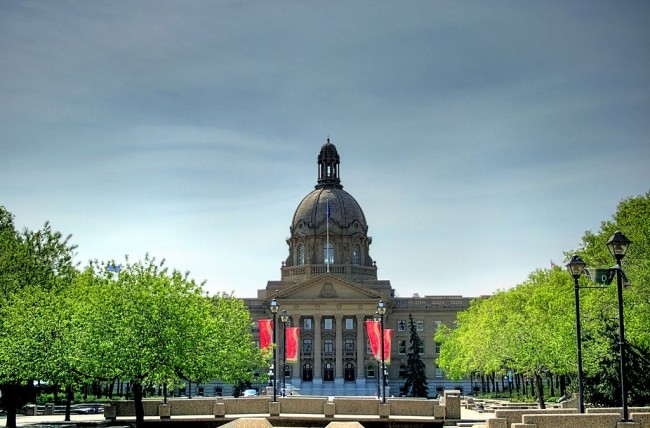
Alberta’s oil woes continue as province hit with credit warning, pipeline snub
by Dean Bennett, The Canadian Press

Province continues struggling through oil rout as headwinds abound

Report says Alta. “unlikely to maintain” metrics consistent with AAA credit rating. PHOTO: Winterforce Media, via Wikimedia Commons
EDMONTON—Beleaguered Alberta took two more gut punches Thursday as a credit-rating agency reported the province is close to its debt ceiling and Quebec mayors slammed a critical pipeline project.
“Today has been a very tough day indeed for Alberta,” said Wildrose Opposition Leader Brian Jean.
Toronto-based agency DBRS affirmed Alberta’s top-drawer triple-A credit rating, but downgraded the province’s fiscal outlook from stable to negative. It said with oil prices so low and the government’s borrowing plans so high, Alberta will exceed its own self-imposed legislated debt limits this fiscal year.
“The (government’s) fiscal response is unlikely to be adequate to maintain credit metrics consistent with the AAA rating, in particular maintaining a DBRS-adjusted debt burden below 15 per cent of GDP,” said the report.
Alberta, under a law passed last year by Premier Rachel Notley’s NDP government, cannot borrow more than 15 per cent of its gross domestic product.
Finance Minister Joe Ceci has said the limit is critical to ensure future generations of Albertans are not saddled with crippling debt payments.
DBRS is the third major credit agency to downgrade Alberta’s prospects since the new year.
Ceci, in a news conference, said he will stick to the long-term financial plan outlined in October’s 2014-15 budget.
That budget calls for ramped up infrastructure spending in years to come, along with no drastic cuts to service levels or staffing and with a projected bottom line of almost $48 billion in debt by the end of the decade.
Ceci challenged DSRB’s contention that the debt ceiling looms.
“We don’t agree,” he said.
He said the debt-to-GDP ratio is currently at about four per cent.
“And that rises for sure, but we show ourselves staying under that debt limit for the fiscal plan that we have started to create in budget 2016,” he said.
Free falling oil prices over the last year and a half have removed billions of dollars from Alberta’s economy and plunged the government deep into the red.
To rectify that imbalance, the province is trying to drum up support for pipeline construction to get its crude to ports and transport it to emerging markets such as Asia.
One pipeline project, Energy East, would take Alberta crude through central Canada to refineries and ports in New Brunswick.
But on Thursday, Montreal Mayor Denis Coderre, speaking for the region’s mayors, rejected the pipeline as too risky environmentally against limited profit for the area.
In Edmonton, Economic Development Minister Deron Bilous said Coderre is not taking into account Alberta’s steps to clean up its environmental record, which includes capping oilsands emissions and instituting a broad-based carbon tax.
He said a rising oil economy helps all Canadians.
“The mayor of Montreal’s statement today is both ungenerous and quite shortsighted,” said Bilous.
Opposition parties said Alberta’s NDP government is reaping its own bitter harvest by not pushing a tougher line with other provinces on how pipeline construction benefits everyone and by not having a credible debt repayment and spending plan in place.
Of Quebec, Wildrose Leader Jean said: “For a province that just dumped eight billion litres of raw sewage (into the St. Lawrence River) and accepted $72 billion in equalization in the last decade, (it is) hypocritical to now reject environmentally responsible pipelines.
“Premier Notley promised a new carbon tax would buy us the social license for new pipelines,” he added.
“What’s happened since that announcement? Nothing but opposition.”
Alberta Party Leader Greg Clark and Ric McIver of the Progressive Conservatives said a better fiscal plan is needed immediately.
“The NDs need to get a handle on both sides of the equation, both the revenue and the spending,” said Clark.